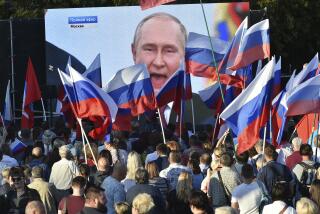COLUMN RIGHT/ VLADIMIR SHLAPENTOKH : It Could Easily Have Gone Another Way : How could Robert Gates have predicted the Soviet fall?
- Share via
The fall of communism and the disintegration of the Soviet empire are milestone events that merit celebration in the West. Several politicians, however, are using these events against those who until recently conducted U.S. policy under the assumption that the Soviet Union presented a mortal threat to the West in general and to the United States in particular.
For instance, in the confirmation hearings of CIA nominee Robert Gates, politicians and commentators have suggested that Gates exaggerated the Soviet threat and thereby contributed to the waste of billions of dollars in defense expenditures.
Those who now criticize America’s aggressive defense policies during the past decade assume that the Soviet Union was already terminally ill by the late 1970s (or even earlier), and that Sovietologists and intelligence analysts like Gates had only to make a proper diagnosis. Instead, according to the critics, Gates and others terrorized the West by propping up a dying giant, and therefore deserve no reward.
The approach to history that underpins this argument is deeply flawed. By arguing that Gates, as a modern Nostradamus, should have predicted the fall of the Soviet Union at least five, if not 10, years ago, his critics assume that the collapse of the Soviet empire was unavoidable. But given the evidence at Gates’ disposal, even Nostradamus could not have made that call.
In the early 1980s, the Soviet Union was both strong and sturdy--a superpower in the true sense of the word. Although the empire suffered from several chronic diseases--including an ailing economy, moral erosion and a corrupt bureaucracy--these diseases posed no immediate danger to the Soviet body politic and had few adverse effects on the country’s internal stability or international standing.
Before 1985, no mass movements endangered the regime, none of the provinces showed any sign of nationalist fervor and the Soviet leaders never considered imposing martial law, either in the provinces or in Moscow. According to all available data, most of the Soviet people trusted the leadership and strongly supported almost all of its foreign and domestic policies.
It is important to remember that, in 1979, debates about national weakness raged not in the Soviet Union but in the United States, as President Carter bemoaned the malaise of American society.
Thus, despite its various chronic diseases, the Soviet empire was, until just a few years before its death, a formidable world power. Its death stemmed not from its chronic diseases, but from an attempt by reformers to invigorate the empire through an infusion of new economic blood. These reformers, led by Mikhail S. Gorbachev, hoped that by modernizing society they could continue the Soviet Union’s military rivalry with the West.
Although the reformers received broad support from the military, which was scared to death of Reagan’s Strategic Defense Initiative and yearned for economic and technological progress, they could easily have lost their slim, precarious majority in the Politburo. If this had happened, the position of general secretary would have gone to a die-hard like Grigori Romanov or Viktor Grishin, just as the position had gone, only two years earlier, to Konstantin Chernenko.
Even with slightly inferior weaponry, a conservative regime in the Soviet Union could have posed a significant threat to the United States. Consider the war with Iraq: Saddam Hussein remains in power and continues to vex the world community. Given its inability to manage events in the Gulf, what could America possibly do with a belligerent Soviet regime, either now or decades down the road?
Gorbachev found himself pushed by political struggles and the logic of reform toward increasing democratization, which resulted in the dismantling of one element of the totalitarian state after another. Although the old political Establishment burned with hatred toward Gorbachev and his reforms, it delayed its showdown. By the time the conservatives went on the offensive, it was too late--the reformers had already created democratic institutions able to delegitimize any conservative move.
Throughout history, American presidents have often had little choice but to strengthen defenses and prepare for the worst. It was just this position vis-a-vis the Soviet Union that provoked the reforms that ultimately buried the Soviet colossus. Although the Senate may find that Robert Gates has flaws serious enough to justify the rejection of his nomination as head of the CIA, his judgment regarding the Soviet Union is not among those flaws.
More to Read
Sign up for Essential California
The most important California stories and recommendations in your inbox every morning.
You may occasionally receive promotional content from the Los Angeles Times.










